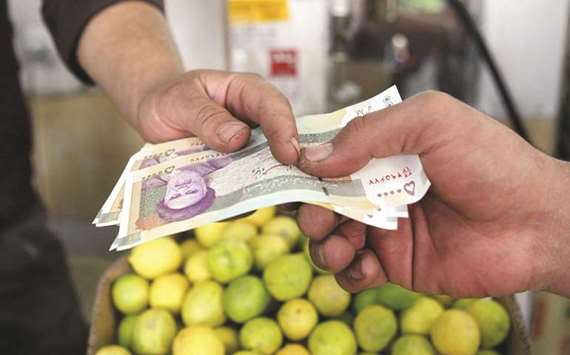The Iranian rial hit a record low against the US dollar for the second time in two months over concerns about Iran’s economy, rattling businesses and prompting some currency dealers to suspend trading.
The rial fell to a record low of 57,000 against the dollar by late afternoon on the unregulated currency market, according to the semiofficial Iranian Students’ News Agency. Several foreign-exchange dealers announced they had stopped selling both dollars and euros by late afternoon trade, according to ISNA.
The greenback first breached 50,000 Iranian rials in February. Authorities arrested scores of traders whom it blamed for deliberately driving the devaluation in order to profit from it. The Central Bank sought to stabilise the currency by issuing a bond and temporarily allowed banks to increase rates on deposits in an attempt to draw investors away from the dollar.
The euro also hit a record 60,000 rials last week and was selling for almost 70,000 rials by the end of Sunday, ISNA reported, citing currency traders in downtown Tehran.
Some foreign-exchange traders attributed the slide to “opportunistic speculation” among dealers who sought to exploit existing worries about Iran’s broader economic health, its continued inability to access overseas financing and the fragility of the nuclear deal.
“Political pressure coming from the Americans is one of the factors. Maybe in name sanctions have been lifted, but in practice countries that can work with us still see Iran as high risk and transferring money is still a big problem,” said Reza, who runs a foreign-exchange business in Tehran and did not want to give his family name.
“Another problem is that we have two different rates for the currency – this means some people will try to exploit this discrepancy,” Reza added. “When they do this, because the volumes are high, it has a big impact on the whole market.”
Many businesses were forced to halt work amid the uncertainty created over prices and the availability of imported materials.
“After speaking to my usual printer, I’ve had to cancel a project because they weren’t selling anything,” said Payam, a 38-year-old in Tehran who owns a small advertising and publishing company. “I was also planning to advertise for new personnel on Saturday – I’ve also cancelled that plan now.”

An Iranian man pays his rial 50,000 banknotes to a seller in a shop in Tehran (file). The rial fell to a record low of 57,000 against the dollar by late afternoon yesterday on the unregulated currency market, according to the semiofficial Iranian Students’ News Agency.
